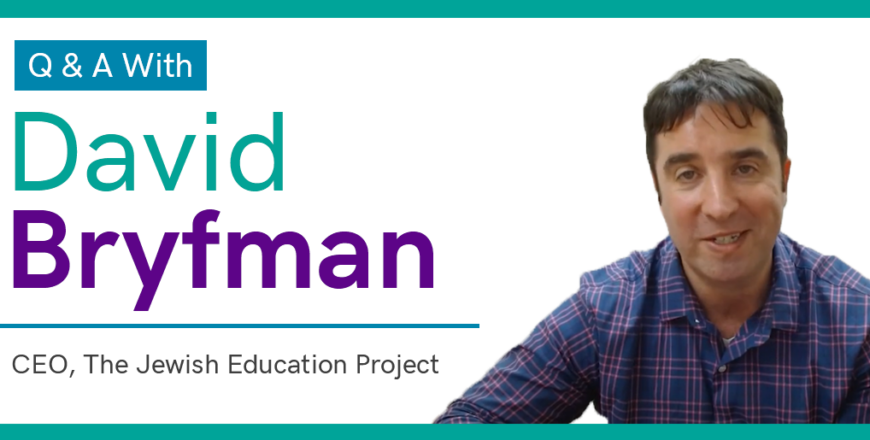
On Trust, Learning, and Advancing the Field: The Jewish Education Project and Rosov Consulting
David Bryfman, CEO of The Jewish Education Project, shares his experience working closely with Rosov Consulting over many years on multiple major projects. Rosov Consulting has provided key research and evaluation for the agency in areas including Jewish teen engagement, Israel travel experiences, and more.
Transcript of video:
In what areas have The Jewish Education Project and Rosov Consulting worked together?
The Jewish Education Project has been involved with several projects and processes with the Rosov Consulting group. I think the most significant work we’ve done has been around the area of Jewish teen engagement and establishing Jewish teen outcomes for the field, where we really work together to try and normalize different parameters for what it means to be engaged as a Jewish community member in the world today.
This work was really important and then it spun off into the current work we’re doing now, which is centering around the RootOne travel program to Israel, which is based on not just the number of kids that go to Israel—but what are the outcomes of the experiences that they’re having there as well.
How would you describe the process/relationship working with Rosov Consulting?
So when we’re talking about the relationship between The Jewish Education Project and Rosov Consulting, it’s pretty important to specify from the beginning that most of our partnerships start with a conversation which has little to do with the project itself, but is just, is this an alignment of where both organizations are? Are we asking the right questions? This is really important to us because it means that when we come to Rosov Consulting, we’re coming to a trusted partner who gets where we are.
There are always critical juncture points where the teams, by necessity and by design, have to come together to determine are we on the right path? Do we need to course correct? And I’ll be really upfront and say that course correction during long term research, methodological experiences is not always common, but when it comes to working with the Rosov Consulting team, it’s their flexibility and the realization that course correcting mid-project is just a sign that will lead to a better research project.
What was the collaboration like with Rosov in measuring outcomes for teens? What do you think is the lasting/ongoing legacy of the teen work?
We were determined to try and flip the paradigm of what constituted success in Jewish teen engagement. At the time when we began, it didn’t really matter what was taking place at that event. We were saying, hang on a second, at a certain point in time, quantity is important, but unless we examine the quality, then we’re not really getting the essence of what Jewish teen engagement is all about.
And that was the essence of the project that we began with Rosov Consulting. The outcomes which we established set a new bar for what Jewish teen engagement begins to look like. Now we’ve got youth educators all around the country involved in how to become better, more proficient in mental health awareness.
Why? Because the first teen objective that we actually identified was that we need to give teens a better sense of self. So the professional development had to be commensurate with that new outcome. It’s really, really important.
And when I’m talking about what it’s like to work with the Rosov Consulting group specifically, that’s the piece of this equation which they really understand, that we’re not just doing something for one client, but what we’re doing can actually impact the broader field, the field of Jewish education. And in doing so, the Jewish community as a whole.
What is Rosov’s role on RootOne? Are there any key early learnings? How might their evaluation work inform teen Israel travel?
So when it comes to RootOne, sending more Jewish teens to Israel, some would ask, why do we even need to evaluate it? We know it works. Now the truth is we know teens going to Israel has a significant impact on their Jewish identity. But what we don’t know is what that means in 2022 and beyond. Who are the kids that are choosing not to go on these programs? We need to understand what training the educators need to have in order to provide successful Israel experiences. We need to know what itineraries to build for these kids, and it’s not the same for every single kid.
The key question we’re asking is what does “work” actually mean in this context? And now we’re applying the Jewish teen outcomes that we’ve done with Rosov Consulting and created with them over years to try and apply them to the Israel experience itself.
And we’re trying to show that by going to Israel in your formative adolescent years, that we can have a significant impact on all aspects of an individual’s growth and development.
Anything else to add about the many and long-term collaborations between The Jewish Education Project and Rosov Consulting?
I do, however, also want mention that these relationships between the organizations are also built on incredibly strong personal relationships that are grounded in a respect and a real mutual feeling that we’re in this together.
We’re able to call each other out and say, hang on, “we really need to look at this more.” Or “you know, this is not showing what you thought it might, and we don’t hide from it.” But we’re able to have the more difficult conversations because the relationships are such that we’re building from a place of not just trust and respect and admiration, but a real place that we always know that we’re in this for the same purpose, for the betterment of the research itself and ultimately for the contributions that we’re making to the Jewish community.




